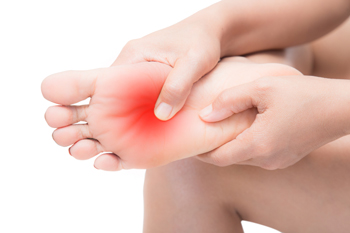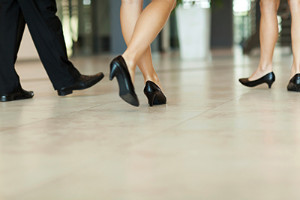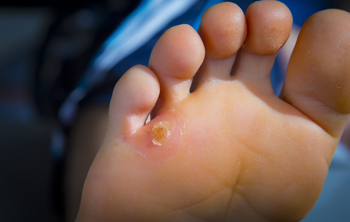Items filtered by date: March 2021
What Is Charcot Foot?
 When the nerves are damaged in the extremities such as the feet, it is known as peripheral neuropathy. This ultimately leads to Charcot foot when the bones in the foot are weakened. These weakened bones can lead to fractures that worsen and cause the joints in the foot to collapse. Charcot foot can cause the foot to become deformed, and it can be disabling and even potentially lead to amputation. Common signs of Charcot foot are a warmness to the touch, redness, swelling, and pain. Because of its association to neuropathy and neuropathy’s association with diabetes, diabetic patients should monitor their feet for this condition. Patients who believe that they may have this condition should consult with a podiatrist as soon as possible. A podiatrist will be able to assess the foot and suggest treatment options.
When the nerves are damaged in the extremities such as the feet, it is known as peripheral neuropathy. This ultimately leads to Charcot foot when the bones in the foot are weakened. These weakened bones can lead to fractures that worsen and cause the joints in the foot to collapse. Charcot foot can cause the foot to become deformed, and it can be disabling and even potentially lead to amputation. Common signs of Charcot foot are a warmness to the touch, redness, swelling, and pain. Because of its association to neuropathy and neuropathy’s association with diabetes, diabetic patients should monitor their feet for this condition. Patients who believe that they may have this condition should consult with a podiatrist as soon as possible. A podiatrist will be able to assess the foot and suggest treatment options.
Neuropathy
Neuropathy can be a potentially serious condition, especially if it is left undiagnosed. If you have any concerns that you may be experiencing nerve loss in your feet, consult with Dr. Ronald Sheppard from Warren-Watchung Podiatry Center. Our doctor will assess your condition and provide you with quality foot and ankle treatment for neuropathy.
What Is Neuropathy?
Neuropathy is a condition that leads to damage to the nerves in the body. Peripheral neuropathy, or neuropathy that affects your peripheral nervous system, usually occurs in the feet. Neuropathy can be triggered by a number of different causes. Such causes include diabetes, infections, cancers, disorders, and toxic substances.
Symptoms of Neuropathy Include:
- Numbness
- Sensation loss
- Prickling and tingling sensations
- Throbbing, freezing, burning pains
- Muscle weakness
Those with diabetes are at serious risk due to being unable to feel an ulcer on their feet. Diabetics usually also suffer from poor blood circulation. This can lead to the wound not healing, infections occurring, and the limb may have to be amputated.
Treatment
To treat neuropathy in the foot, podiatrists will first diagnose the cause of the neuropathy. Figuring out the underlying cause of the neuropathy will allow the podiatrist to prescribe the best treatment, whether it be caused by diabetes, toxic substance exposure, infection, etc. If the nerve has not died, then it’s possible that sensation may be able to return to the foot.
Pain medication may be issued for pain. Electrical nerve stimulation can be used to stimulate nerves. If the neuropathy is caused from pressure on the nerves, then surgery may be necessary.
If you have any questions, please feel free to contact one of our offices located in Marlboro and Watchung, NJ . We offer the newest diagnostic and treatment technologies for all your foot care needs.
Reminder: When Was the Last Time...?
What Shoes Should I Wear if I Have Arthritis?
Many forms of arthritis affect the feet. Osteoarthritis, the form of arthritis associated with aging, is often accompanied by the development of bunions on the big toes. Shoes with a wider toe box can help avoid irritating the bunions. It is suggested that you avoid shoes with high heels or narrow, pointed toes, which can push the foot forward and compress the toes, thereby increasing pressure on the bunions and causing more pain. Rheumatoid arthritis often causes inflammation in the joints on the balls of the feet and the toes, leading to calluses and hammertoes. Rheumatoid arthritis can also cause lumps of soft tissue, called nodules, to form on the sides of the foot and rub against the shoes. To avoid foot pain associated with rheumatoid arthritis, wearing wide, box-toed shoes without laces is suggested. For more information about which types of shoes are best for arthritic foot pain, please consult with a podiatrist.
Arthritis can be a difficult condition to live with. If you are seeking treatment, contact Dr. Ronald Sheppard from Warren-Watchung Podiatry Center. Our doctor can provide the care you need to keep you pain-free and on your feet.
Arthritic Foot Care
Arthritis is a joint disorder that involves the inflammation of different joints in your body, such as those in your feet. Arthritis is often caused by a degenerative joint disease and causes mild to severe pain in all affected areas. In addition to this, swelling and stiffness in the affected joints can also be a common symptom of arthritis.
In many cases, wearing ill-fitting shoes can worsen the effects and pain of arthritis. Wearing shoes that have a lower heel and extra room can help your feet feel more comfortable. In cases of rheumatoid arthritis, the arch in your foot may become problematic. Buying shoes with proper arch support that contour to your feet can help immensely.
Alleviating Arthritic Pain
- Exercises that stretch the foot can prevent further pain and injury and increase mobility
- Most of the pain can be alleviated with anti-inflammatory drugs, heat, and topical medications
- Massages can help temporarily alleviate pain.
It is best to see your doctor for the treatment that is right for your needs and symptoms. Conditions vary, and a podiatrist can help you determine the right method of care for your feet.
If you have any questions, please feel free to contact one of our offices located in Marlboro and Watchung, NJ . We offer the newest diagnostic tools and technology to treat your foot and ankle needs.
Wearing High Heels With Bunions
 Bunions, bony bumps on the sides of the feet that often form at the big toe joint, can cause pain or discomfort. This problem is exacerbated by wearing shoes that have excessively high heels, pointed toes, or a fit that is too tight. While you don’t have to give up high heels forever, if you have a bunion, it is recommended that you make changes when it comes to the type of heels you wear and how frequently you wear them. When picking out your shoes, opt for those with a heel no higher than two inches. You should also look for wider shoes that have built-in support and cushioning. Rather than wearing high heels daily, it is recommended that you give your feet a break often, by resting the feet, wearing flats, and doing foot stretches regularly. For more information about bunions, or if you have painful bunions, please consult with a podiatrist.
Bunions, bony bumps on the sides of the feet that often form at the big toe joint, can cause pain or discomfort. This problem is exacerbated by wearing shoes that have excessively high heels, pointed toes, or a fit that is too tight. While you don’t have to give up high heels forever, if you have a bunion, it is recommended that you make changes when it comes to the type of heels you wear and how frequently you wear them. When picking out your shoes, opt for those with a heel no higher than two inches. You should also look for wider shoes that have built-in support and cushioning. Rather than wearing high heels daily, it is recommended that you give your feet a break often, by resting the feet, wearing flats, and doing foot stretches regularly. For more information about bunions, or if you have painful bunions, please consult with a podiatrist.
If you are suffering from bunions, contact Dr. Ronald Sheppard of Warren-Watchung Podiatry Center. Our doctor can provide the care you need to keep you pain-free and on your feet.
What Is a Bunion?
A bunion is formed of swollen tissue or an enlargement of boney growth, usually located at the base joint of the toe that connects to the foot. The swelling occurs due to the bones in the big toe shifting inward, which impacts the other toes of the foot. This causes the area around the base of the big toe to become inflamed and painful.
Why Do Bunions Form?
Genetics – Susceptibility to bunions are often hereditary
Stress on the feet – Poorly fitted and uncomfortable footwear that places stress on feet, such as heels, can worsen existing bunions
How Are Bunions Diagnosed?
Doctors often perform two tests – blood tests and x-rays – when trying to diagnose bunions, especially in the early stages of development. Blood tests help determine if the foot pain is being caused by something else, such as arthritis, while x-rays provide a clear picture of your bone structure to your doctor.
How Are Bunions Treated?
- Refrain from wearing heels or similar shoes that cause discomfort
- Select wider shoes that can provide more comfort and reduce pain
- Anti-inflammatory and pain management drugs
- Orthotics or foot inserts
- Surgery
If you have any questions, please feel free to contact one of our offices located in Marlboro and Watchung, NJ . We offer the newest diagnostic and treatment technologies for all your foot care needs.
How Plantar Warts Can Rub You the Wrong Way
 Certain strains of Human Papillomavirus (HPV) can produce individual or clustered plantar warts on the sole of the foot where there is friction or pressure. Although harmless, these small and flat lesions can be uncomfortable or even painful. Plantar warts are contagious and can spread from person to person in communal spaces like public showers. They are most common in 12-16 year olds, and people most at risk for plantar warts have weakened immune systems, or cuts or scrapes on their feet. These warts can eventually disappear, but it may take years for them to do so. Home remedies for pain relief or removal may be tempting, but they can be ineffective or even risky. For professional treatment, consult with a podiatrist who has many effective and safe ways to remove or resolve plantar warts.
Certain strains of Human Papillomavirus (HPV) can produce individual or clustered plantar warts on the sole of the foot where there is friction or pressure. Although harmless, these small and flat lesions can be uncomfortable or even painful. Plantar warts are contagious and can spread from person to person in communal spaces like public showers. They are most common in 12-16 year olds, and people most at risk for plantar warts have weakened immune systems, or cuts or scrapes on their feet. These warts can eventually disappear, but it may take years for them to do so. Home remedies for pain relief or removal may be tempting, but they can be ineffective or even risky. For professional treatment, consult with a podiatrist who has many effective and safe ways to remove or resolve plantar warts.
Plantar warts can be very uncomfortable. If you need your feet checked, contact Dr. Ronald Sheppard from Warren-Watchung Podiatry Center. Our doctor will assist you with all of your foot and ankle needs.
About Plantar Warts
Plantar warts are the result of HPV, or human papillomavirus, getting into open wounds on the feet. They are mostly found on the heels or balls of the feet.
While plantar warts are generally harmless, those experiencing excessive pain or those suffering from diabetes or a compromised immune system require immediate medical care. Plantar warts are easily diagnosed, usually through scraping off a bit of rough skin or by getting a biopsy.
Symptoms
- Lesions on the bottom of your feet, usually rough and grainy
- Hard or thick callused spots
- Wart seeds, which are small clotted blood vessels that look like little black spots
- Pain, discomfort, or tenderness of your feet when walking or standing
Treatment
- Freezing
- Electric tool removal
- Laser Treatment
- Topical Creams (prescription only)
- Over-the-counter medications
To help prevent developing plantar warts, avoid walking barefoot over abrasive surfaces that can cause cuts or wounds for HPV to get into. Avoiding direct contact with other warts, as well as not picking or rubbing existing warts, can help prevent the further spread of plantar warts. However, if you think you have developed plantar warts, speak to your podiatrist. He or she can diagnose the warts on your feet and recommend the appropriate treatment options.
If you have any questions please feel free to contact one of our offices located in Marlboro and Watchung, NJ . We offer the newest diagnostic and treatment technologies for all your foot and ankle needs.
Types of Corns on the Feet
 A corn on the foot is a small area of hardened skin that typically develops as a result of excess friction. They can develop from wearing shoes and socks that do not fit correctly. Soft corns can form between the toes and can remain moist as they rub against the neighboring toes. This type of corn can cause severe pain and can alter the gait to compensate for the discomfort. Hard corns can form on the outside of the pinky toe, or on the sole of the foot. These can develop from standing for the majority of the day, in addition to having aging feet. One potential treatment option is wearing the correct shoes in order to eliminate a portion of the friction on the corn. Corns can be quite painful, and it is suggested that you speak to a podiatrist about how to prevent and treat corns on the feet.
A corn on the foot is a small area of hardened skin that typically develops as a result of excess friction. They can develop from wearing shoes and socks that do not fit correctly. Soft corns can form between the toes and can remain moist as they rub against the neighboring toes. This type of corn can cause severe pain and can alter the gait to compensate for the discomfort. Hard corns can form on the outside of the pinky toe, or on the sole of the foot. These can develop from standing for the majority of the day, in addition to having aging feet. One potential treatment option is wearing the correct shoes in order to eliminate a portion of the friction on the corn. Corns can be quite painful, and it is suggested that you speak to a podiatrist about how to prevent and treat corns on the feet.
Corns can make walking very painful and should be treated immediately. If you have questions regarding your feet and ankles, contact Dr. Ronald Sheppard of Warren-Watchung Podiatry Center. Our doctor will treat your foot and ankle needs.
Corns: What Are They? And How Do You Get Rid of Them?
Corns are thickened areas on the skin that can become painful. They are caused by excessive pressure and friction on the skin. Corns press into the deeper layers of the skin and are usually round in shape.
Ways to Prevent Corns
There are many ways to get rid of painful corns such as:
- Wearing properly fitting shoes that have been measured by a professional
- Wearing shoes that are not sharply pointed or have high heels
- Wearing only shoes that offer support
Treating Corns
Although most corns slowly disappear when the friction or pressure stops, this isn’t always the case. Consult with your podiatrist to determine the best treatment option for your case of corns.
If you have any questions please feel free to contact one of our offices located in Marlboro and Watchung, NJ . We offer the newest diagnostic and treatment technologies for all your foot and ankle needs.


